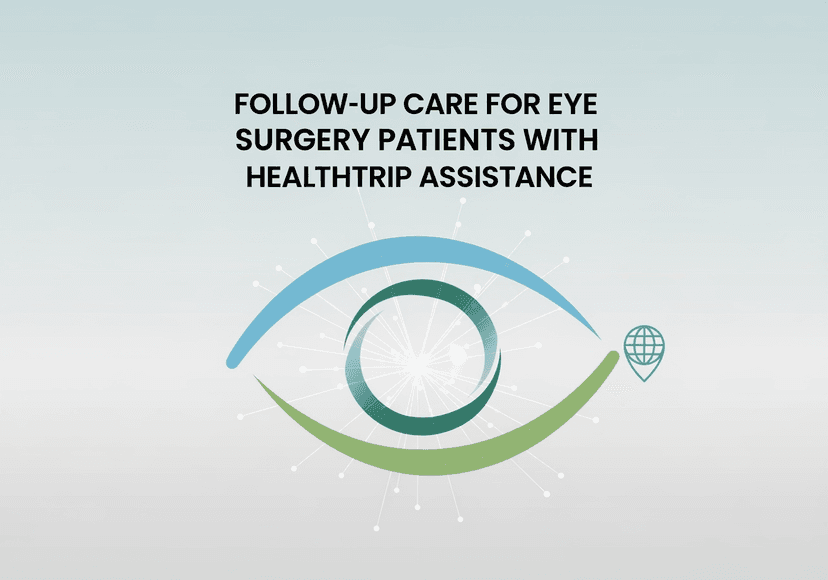
Understanding Healthcare Accreditation in Indian Hospitals
28 Jun, 2025
 Healthtrip
Healthtrip- < li>Why is Accreditation Crucial for Indian Hospitals?
- Who are the Key Accreditation Bodies in India? (NABH & JCI)
- The Journey to Quality: How Do Hospitals Get Accredited?
- What are the Core Standards for Hospital Accreditation?
- Examples of Top Accredited Hospitals in India: Fortis Escorts Heart Institute, Fortis Memorial Research Institute, and Max Healthcare Saket
- How Can You, as a Patient, Verify a Hospital's Accreditation?
- Conclusion: The Unwavering Commitment to Quality Healthcare
Most popular procedures in India
Why is Accreditation Crucial for Indian Hospitals?
Let's be honest, stepping into a hospital, whether for yourself or a loved one, can be a nerve-wracking experience. You're placing your most precious asset—your health—into the hands of others. In that vulnerable moment, what you crave most is trust. But how do you measure trust? How can you be sure that the hospital you've chosen is truly committed to your safety and well-being? This is where accreditation comes in, acting as a powerful and reliable beacon of quality. Think of it as a comprehensive report card for a hospital, graded not by the institution itself, but by an impartial, expert third party. It’s not just a fancy certificate to hang in the lobby; it’s a testament to a deep-seated commitment to excellence that permeates every corner of the facility. Accreditation signifies that a hospital, like the esteemed Fortis Memorial Research Institute, Gurgaon, has voluntarily undergone a rigorous and exhaustive evaluation of its systems, processes, and outcomes. It confirms that the hospital adheres to the highest standards of patient safety, clinical care, and operational efficiency. It means there are strict protocols for infection control, medication management, and patient rights. For you, the patient, this seal of approval translates into tangible benefits and, most importantly, peace of mind. It assures you that you are entering a safe environment where quality isn't just a buzzword, but a lived reality, a core principle that Healthtrip champions when connecting you to world-class medical facilities.
Wellness Treatments
Give yourself the time to relax
Lowest Prices Guaranteed!

Lowest Prices Guaranteed!
Who are the Key Accreditation Bodies in India? (NABH & JCI)
Navigating the world of healthcare can feel like learning a new language, with acronyms and terms that can be confusing. When it comes to hospital accreditation in India, there are two main names you should know: NABH and JCI. They are the gatekeepers of quality, the organizations that set the bar for what excellent healthcare should look like. Understanding what they represent can empower you to make more informed decisions about your care, a core mission we share at Healthtrip. Let's break them down.
NABH: India's Gold Standard
NABH stands for the National Accreditation Board for Hospitals & Healthcare Providers. Think of NABH as India's own homegrown champion of quality. It's a constituent board of the Quality Council of India, set up to establish and operate an accreditation program for healthcare organizations. What makes NABH so significant is that its standards are specifically designed for the Indian healthcare landscape, addressing the unique challenges and opportunities within the country. However, this doesn't mean they are any less stringent; NABH standards are benchmarked against global best practices. When a hospital like Fortis Shalimar Bagh achieves NABH accreditation, it signals a profound commitment to providing top-tier care that meets national benchmarks of excellence. It shows they have invested heavily in creating a culture of continuous improvement, focusing on everything from patient-centered communication to the credentials of their medical staff. For domestic patients, NABH is a reliable indicator that you're in safe, capable hands, receiving care that is structured, safe, and of the highest quality.
JCI: The Global Benchmark for Excellence
If NABH is the national champion, then JCI, or Joint Commission International, is the global Olympian. JCI is the international arm of The Joint Commission, the body that has been accrediting hospitals in the United States for over 60 years. Achieving JCI accreditation is a monumental accomplishment for any hospital, as it signifies that its quality of care and patient safety standards are on par with the very best medical institutions worldwide. This is particularly crucial for medical tourism, a field where Healthtrip is a trusted guide. When a patient travels from another country for treatment, the JCI seal acts as a universal symbol of trust and excellence. It tells them that a hospital, whether it's Max Healthcare Saket in India or Memorial Bahçelievler Hospital in Turkey, speaks the international language of quality. JCI's standards are famously rigorous, covering areas like patient access to care, surgical safety, and ethical organizational practices. For a hospital to earn this accreditation, it must prove that it can deliver a consistently high level of care that transcends borders and languages, providing a safe and reassuring experience for every patient who walks through its doors.
The Journey to Quality: How Do Hospitals Get Accredited?
Earning an accreditation from a body like NABH or JCI isn't like passing a simple test or just filling out some paperwork. It's a profound, transformative journey—a marathon of dedication, not a sprint for a certificate. This process fundamentally reshapes a hospital's culture, embedding quality into its very DNA. It begins with a courageous decision from the hospital's leadership to voluntarily open themselves up to intense scrutiny, all in the pursuit of becoming better. The first step is a deep, honest self-assessment and gap analysis. The hospital meticulously compares its current practices against hundreds of detailed standards set by the accrediting body. This is the "look in the mirror" moment, where they identify every area that needs improvement, from how they store medications to how they handle patient complaints. Following this, the real work begins. It involves a massive, organization-wide effort to implement new protocols, re-train staff at every level—from senior surgeons to the administrative and housekeeping teams—and often, invest in upgrading infrastructure and technology. It’s about building new systems for everything, ensuring that patient safety and quality care are the top priorities in every single action taken within the hospital walls. It might involve creating new checklists for surgeries, revamping infection control procedures, or establishing a more robust system for patient feedback. This transformative phase can take many months, sometimes even years, of relentless effort and commitment. Finally, the hospital undergoes a rigorous on-site survey. A team of expert surveyors from NABH or JCI spends several days at the hospital, observing procedures, reviewing patient records, interviewing staff and patients, and checking compliance with every single standard. They leave no stone unturned. Achieving accreditation, as seen in top institutions like NMC Royal Hospital, DIP, Dubai or Bangkok Hospital, is the culmination of this incredible journey, but it's not the end. It marks the beginning of a continuous commitment to maintaining and exceeding these high standards, ensuring that every patient receives the safest, highest quality care possible, every single day—a commitment that Healthtrip proudly showcases in its network of partner hospitals.
Also Read:
What are the Core Standards for Hospital Accreditation?
When you hear "accreditation standards," it's easy to picture a stuffy room filled with binders and checklists. But let’s reframe that. Think of these standards as a comprehensive promise—a hospital's solemn vow to protect and prioritize you at every step of your health journey. At its heart, accreditation is all about patient-centered care. This means your rights as a patient are not just respected but championed. It ensures that communication is clear, compassionate, and consistent, so you're never left in the dark about your own health. It's about informed consent, where you are an active partner in decisions, not a passive recipient of care. Beyond that, these standards dive deep into the nitty-gritty of clinical excellence. They scrutinize everything from infection control protocols—crucial for preventing complications—to medication management, ensuring you get the right dose at the right time. They look at surgical safety checklists, which act like a pilot's pre-flight check to guarantee every safety measure is in place before a procedure begins. They also cover the physical environment, from fire safety to the structural integrity of the building, and the continuous training of staff. It's a holistic framework designed for one purpose: to create a sanctuary of safety and quality where you can heal with confidence.
A Glimpse into Top Accredited Hospitals Worldwide
The beauty of accreditation is that it creates a universal language of quality, allowing patients to seek care across borders with unwavering trust. This global standard of excellence is embodied by numerous hospitals in the Healthtrip network, each a testament to an unwavering commitment to patient safety and superior outcomes. In India, for instance, institutions like the Fortis Escorts Heart Institute and Fortis Memorial Research Institute, Gurgaon, have set benchmarks in specialized care, earning the trust of patients from around the world. Similarly, Max Healthcare Saket stands as a pillar of integrated healthcare services, its accreditation a clear signal of its dedication to quality. But this commitment isn't confined by geography. Look to Turkey, where Memorial Sisli Hospital offers world-class treatments, or to the UAE, where NMC Royal Hospital, DIP, Dubai provides exceptional care. In Germany, the Helios Klinikum Erfurt showcases clinical precision, while in Thailand, Yanhee International Hospital is renowned for both specialized and cosmetic procedures. Choosing any of these hospitals through a partner like Healthtrip means you are not just choosing a facility; you are choosing a pre-vetted institution where your well-being is the highest priority, backed by internationally recognized standards.
Also Read:
How Can You, as a Patient, Verify a Hospital's Accreditation?
In an age of information, you, the patient, are more empowered than ever before. Verifying a hospital’s accreditation isn't a secret process reserved for insiders; it's a transparent check you can and should perform. Think of it as doing your due diligence for the most important thing you have—your health. The first and simplest step is to visit the hospital's official website. Accredited hospitals are incredibly proud of their status and usually display the logos of their accrediting bodies, like JCI (Joint Commission International) or NABH (National Accreditation Board for Hospitals & Healthcare Providers), prominently on their homepage. For an even more definitive check, you can go straight to the source. The official websites of accrediting bodies like JCI have a searchable online database. You can simply type in the hospital’s name and see its accreditation status and validity for yourself. Don't be shy about asking directly, either! A simple email or a call to the hospital's administration or international patient desk is perfectly acceptable. A quality-focused hospital will be happy to provide this information. Of course, the easiest path is to partner with a trusted guide like Healthtrip. We do all this rigorous verification for you. Our network is built exclusively on accredited hospitals, so when you explore options with us, you’re already looking at a curated list of institutions that have met and exceeded stringent global standards. This frees you from the stress of background checks and allows you to focus on what truly matters: choosing the right place for your healing journey.
Conclusion: The Unwavering Commitment to Quality Healthcare
Ultimately, a hospital's accreditation is so much more than a certificate hanging in a lobby. It is the tangible proof of a deep-seated culture of excellence, a daily commitment practiced by every doctor, nurse, and staff member. It’s a promise that the hospital holds itself accountable not just to a governing body, but to you, the patient. Choosing an accredited hospital is an act of self-advocacy; it's you making a conscious decision to place your trust in an institution that has proven its dedication to safety, ethics, and superior clinical outcomes. The peace of mind that comes from this knowledge is immeasurable, especially when you are navigating the complexities of a health concern, perhaps even in a new country. At Healthtrip, we understand this profoundly. Our mission is to bridge the gap between you and the world's finest, most reliable healthcare. We believe that everyone deserves access to care that isn't just effective, but is also safe and compassionate. By connecting you exclusively with accredited hospitals, we aim to remove the uncertainty from your medical journey, empowering you to make choices with confidence and clarity. Your health is your greatest asset, and ensuring it is in the safest hands is a commitment we share with you, every step of the way.
Most popular wellness packages
Related Blogs

Complete Cost Breakdown of Eye Surgery with Healthtrip
Learn about doctors, hospitals, procedures, and recovery for eye surgery

How to Prepare for Your Eye Surgery in India
Learn about doctors, hospitals, procedures, and recovery for eye surgery

Side Effects and Risk Management of Eye Surgery
Learn about doctors, hospitals, procedures, and recovery for eye surgery

Follow-Up Care for Eye Surgery Patients with Healthtrip Assistance
Learn about doctors, hospitals, procedures, and recovery for eye surgery

Best Hospital Infrastructure for Eye Surgery
Learn about doctors, hospitals, procedures, and recovery for eye surgery

What to Expect During a Eye Surgery Consultation
Learn about doctors, hospitals, procedures, and recovery for eye surgery










